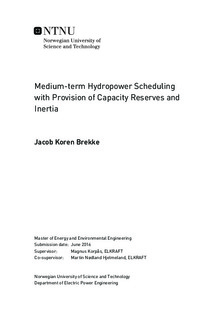Medium-term Hydropower Scheduling with Provision of Capacity Reserves and Inertia
Master thesis
Permanent lenke
http://hdl.handle.net/11250/2409469Utgivelsesdato
2016Metadata
Vis full innførselSamlinger
- Institutt for elkraftteknikk [2443]
Sammendrag
The European power system has seen an increased penetration of renewable energy sources in the recent years, especially wind and solar power, causing a greater demand for balancing services. Renewable power generation varies a lot depending on weather conditions and does not easily provide the grid with inertia, compromising the stability of the grid. It is therefore crucial to ensure sufficient capacity and energy reserves, and system inertia to secure stability in the power grid. Especially during summer months, it is expected that low dispatchable generation and a significant import of cheap renewable energy will reduce the system inertia in the Nordic region. This provides an incentive for the TSO to either invest in equipment, or remunerate power producers, for the provision of inertia to the power system. This provision of inertia would, however, impose a cost on the hydropower producer.
The main objective of this thesis is to study the effects of participation in a hypothetical rotational energy market alongside the day-ahead and primary frequency reserve markets on medium-term hydropower scheduling. Participants in the rotational energy market are remunerated for provision of rotational energy that does not alter production. A case study on a Norwegian hydropower system will be conducted with focus on evaluating the cost of providing ancillary services.
Stochastic medium-term hydropower scheduling models are usually based on optimization techniques which require Linear Programming (LP) problems to ensure computational tractability. This imposes simplifications on the problem formulation, such as operating states which typically have a binary nature. Utilizing a strategy obtained by Stochastic Dual Dynamic Programming (SDDP) in a simulator model based on Mixed Integer Programming (MIP) yields a detailed system description and practical computation time.
For the given case study, it was found that rotational energy provision has a small effect on medium-term hydropower scheduling, due to the short time period of critically low inertia. It was also found that the necessary price to cover the investment cost, associated with rotational energy provision, was at a level that caused interference with the optimal production strategy. However, increasing the price in certain time steps and decreasing it in others was shown to mitigate this problem.
